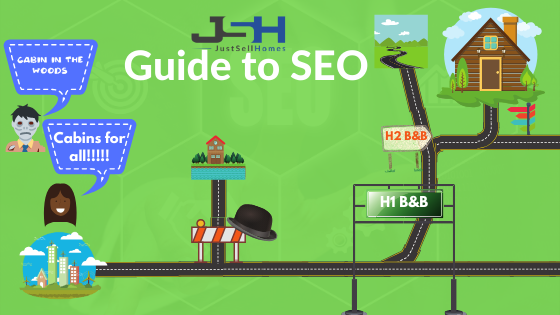For the sake of simplifying Search Engine Optimization (SEO) for real estate —and to take the edge off an otherwise intimidating task — we’ll liken your website to a cozy cabin in the woods.
You’ve converted said cabin into a bed and breakfast and now you need to fill it with customers (stay with me here). But much like the real estate industry, your badass B&B faces steep competition. Fortunately, you’re about to learn simple SEO principles that’ll kickstart your ranking quest and give you the edge over competitors.
So what exactly does Google look for in a high ranking website?
High Quality Content
Google has one goal for their users: To serve them the best possible answer to their search or ‘query‘. If your real estate website lacks quality content that people will find valuable, you’ll never be a blip on Google’s radar.
How can Google tell if people like your content? One determining factor is your bounce rate. If website visitors don’t see a reason to stick around, they’ll quickly bail — or “bounce” — signaling Google that your content wasn’t useful.
So if your B&B cabin was rundown and riddled with cockroaches, most sane people would u-turn and leave. I mean, if you saw a bunch of people running out, would you spend your money there?
Same concept.
💡The takeaway: Above all, focus on creating content that potential clients will find valuable. Keeping them engaged and coming back for more is key for successful real estate SEO.
High Quality Backlinks
After some reno love, your B&B cabin hits 5-star status. But just because you built it, doesn’t mean they’ll come. If you want people to come to your cabin, you need a boost.
Wait —what’s this? Oprah just raved about your hot new five-star B&B during Super Soul Sunday. You just hit the instant credibility jackpot. People start to flock.
In the other corner, Mr. Sketchy on the street is incoherently rambling about this ‘killer cabin in the woods.’ In this case, one might think meth shack over cozy cabin. Bottom line: No one is going —at least not the caliber of customer you’re shooting for.
That’s the idea behind backlinks —one of the most potent techniques to showcase your value to Google and drive traffic to your website. When another website links to yours, it validates the quality of your website to Google. But you don’t want just any website linking to yours. Untrustworthy websites with bad content won’t help.
💡Just a Tip: So how do you earn links from high end website in your niche? Make a list of 5 well respected, authoritative websites in your niche and pitch them with an idea for a guest blog post. In your article, weave in a link or two that directs traffic to relevant content on your site. Sidenote: Some sites don’t allow backlinks in guest posts so be sure to clear it with them first.
As a real estate pro, you know how powerful word of mouth can be. Why not leverage it online?
Keywords
When it comes to SEO for real estate, you’ll need to know the keywords you want to rank for. When someone searches specific words and terms in Google, these words signal Google that your content is a match.
For example, someone searches “Toronto Homes for Sale.” If your website doesn’t once mention “Toronto Homes for Sale,” Google won’t once mention you.
What are your potential clients searching for? Consult Google’s free keyword planner to figure it out. Be warned though, to rank for the top terms, competition is stiff. And rather pricey.
Companies like Zillow, RE/MAX, and Royal LePage spend a LOT of money to get their site ranking —more than you’d ever feasibly spend. So trying to outrank them for the keywords “homes for sale in Toronto” is a pipe dream.
So how do you compete with the big guys? Well. Your random “bed and breakfast cabin in the woods” search term won’t make the cut. But “bed and breakfast cabin in the woods for people with Chihuahua’s,” will surge your odds of ranking high.
Aim to start ranking for terms that those big sites don’t target. This means in-depth, specific and local.
Think of a buyer’s linear path —what’s the earliest you can hook them? For example, someone searching for “homes for sale” is already in house hunting mode and pretty late in the process.
You want to nab them information gathering mode.
Think of hot topic questions people might search. To illustrate, everyone was talking about bully offers a few years ago. So I created a blog post entitled “What is a bully offer?”. That post single handedly brought hundreds of people to my website every week.
Visitors will come to your website for something like that, and stay for the great information. That’s when you swoop in and start building relationships with them. By the time they’re ready to start looking for homes, it doesn’t matter if they end up on Zillow or Realtor.ca — you’re already working with them!
The more niche you can go the better, too. If you rank for “bungalows for sale in Leslieville with pools within walking distance of the 501 streetcar” you won’t have much competition. Those are long-tail keywords.
💡Just a tip: If you farm a specific neighbourhood, create an in-depth page on your website about every single street. Add a new street every week. Over time, any time someone Googles a street in your area, they’ll end up on your site.
Low volume but high value traffic!
Header Tags
Header tags are valuable for real estate SEO. They point Google to what’s important.
Think of headers as the ‘Turn Here‘ and ‘Exit here for 5 Star Bed and Breakfast Cabin’ highway signs that help people navigate to you.
Use header tags in an H1, H2, H3, etc. format to emphasize specific text. Your H1 tag should only be used once on a page to highlight the keyword you’re trying to rank for. H2, H3, and so on should highlight other pieces you want to emphasize.
Headers also improve your content’s readability. People skim blog posts online so using headers to break up the content into sections makes for a better reader experience overall.
Internal Links
While backlinks are important, so are internal links or links that connect to other pages on your website. They make it easy for Google to find more content on your site and better understand it’s structure.
As a top notch B&B, you provide each guest with a welcome packet that includes a list of on-site activities, available amenities and instructions on how to get to their room.
Internal links serve the same purpose —not only to guide Google but encourage your guests to spend more time on your site. The more time spent on your website, the more likely they are to do business with you.
Site Speed
Whether it’s SEO for real estate or a cabin in the woods, speed matters. You’re likely to get more business if your cabin is 10 minutes from the customer source versus 5 hours. The longer it takes to get there, the harder it will be to attract people.
The same goes for your website. The longer it takes to load, the less likely they are to use it or ever come back.
Large images, heavy graphics, or too many plugins can reduce your sites load time. The slower it is, the lower Google will want to rank your site in search results.
Mobile Responsiveness
Ninety percent or more of your traffic will likely come from a mobile device. That means if your site isn’t mobile friendly, your Google rank will plummet.
To milk the cabin analogy — because there’s nothing like beating a dead horse — if that area was a dead zone and people couldn’t use their phones, your customers would be miffed. Not having a mobile friendly website is a quick way to tank your traffic volume and your relationship with Google.
Now that we’ve unpacked your basic SEO elements, we’ll touch on some best practices.
What is White Hat & Black Hat SEO?
There’s a right way and a wrong way to do it SEO for real estate. Ever heard of the terms “white hat” or “black hat SEO?”
White hat SEO is the right way. It’s what Google wants. It’s optimizing your site to help Google learn where it should rank online. Black hat SEO —spoiler alert — is the opposite. It’s trying to game the system, find loopholes and exploit them.
It would be like putting up 1,000 open house signs all over town when town by-laws state only 4. They may work in the short term but will catch up with you. Google could de-list you entirely.
💡The takeaway: Do what it takes to please the Google Gods and play fair.
Getting Results From SEO
It’s worth mentioning that once you start creating great content and implementing SEO, it could take 6 months or more to start seeing measurable results. Sure, you won’t reap the rewards overnight. But keep it up. It’s worth it.
We’ve barely scratched the surface of SEO for Real Estate. It’s a complex and in depth practice with cutthroat competition. But this simplified guide is enough to help kickstart your ranking quest.
Tired of second guessing whether you’re doing SEO right? Or maybe you’re just getting started with digital marketing and need timely advice from pros while you implement…That’s what the Wheel House Elite is for.







0 Comments